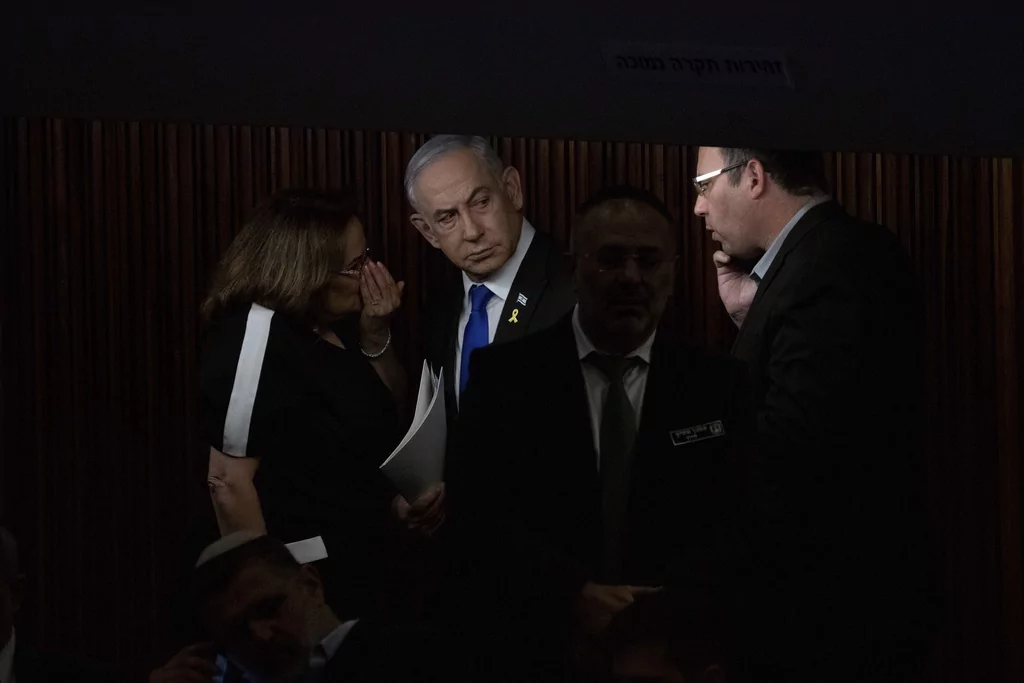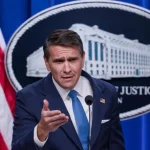
President Joe Biden’s sudden status as the isolated and outgoing commander in chief has thrown a wrench into Israeli Prime Minister Benjamin Netanyahu’s attempt to rally U.S. opposition to Iran and its proxies, as the embattled premier faces a cold shoulder from Democratic leaders amid pressure from his own security establishment.
“I think what we’re going to see is a prime minister of Israel that tries to shift the focus to … [the analysis that] Israel is at war with Iran,” Foundation for Defense of Democracies Senior Vice President Jonathan Schanzer told the Washington Examiner. “It is a multifront war that is now being waged across the Middle East — Lebanon, Gaza, West Bank, Iraq, Syria, Yemen, Iran itself — all of these fronts have gone hot at different points over the last nine months, but they are all part of a much bigger picture that I believe has been lost on the American public.”
And yet, as he approached Washington, it wasn’t clear how much of Netanyahu’s agenda was achievable. Biden, still recovering from COVID and the political mutiny that forced him to abandon his reelection bid, couldn’t confirm that he would meet Netanyahu after all and Vice President Kamala Harris decided to hit the campaign trail during his speech, although she did agree to meet with him in private.
“She will reiterate her deep concerns about the humanitarian situation in Gaza and the loss of innocent life,” an aide to Harris said Monday. “We anticipate the Vice President will convey her view that it is time for the war to end in a way where Israel is secure, all hostages are released, the suffering of Palestinian civilians in Gaza ends, and the Palestinian people can enjoy their right to dignity, freedom, and self-determination. And they will discuss efforts to reach agreement on the ceasefire deal.”

Netanyahu’s team also heard indirectly from Biden, who previewed the remaining months of his presidency in a call with campaign staff.
“I’ll be working very closely with the Israelis and with the Palestinians to try to work out how we can get the Gaza war to end, and Middle East peace, and get all those hostages home,” Biden said Monday, in remarks aired for the public. “I think we’re on the verge of being able to do that.”
Yet Biden’s message touches on several issues that have undermined Netanyahu’s standing at home and abroad, in the 10th month of a grinding war for the “destruction of Hamas” and the release of the hostages seized by the terrorist group during their rampage across southern Israel on Oct. 7. The civilian casualties and humanitarian crisis in Gaza led to an uproar in the United States and across the American alliance network. Secretary of State Antony Blinken has emphasized that Hamas is “using civilians as human shields,” but congressional leaders had to scramble to find a Senate Democrat willing to sit behind Netanyahu during his address. Senate President Pro Tempore Patty Murray (D-WA) also refused to play the part.
After a bit of searching, Senate Foreign Relations Chairman Ben Cardin, who is not seeking reelection, emerged as the Senate Democrat who would preside over the address. Furthermore, the arriving prime minister was not met by any cabinet-level dignitaries when he landed at Joint Base Andrews. On scale, it was a frosty reception that threatens to diminish the effect of the pageantry that Netanyahu has hoped to enjoy.
“He’s beleaguered by the Israeli left and even to some extent, the Israeli center and the challenges to his rule,” Schanzer said. “So this is [intended] to be his opportunity to counter all of that and demonstrate that he is a statesman, that he is a world leader, that he is still very much welcomed. That’s the message that he’s going to deliver at home.”
If it all goes well enough, it could help Netanyahu to fortify his position among Israeli voters angered by his government’s failures in the lead-up to the Oct. 7 terrorist attack that ignited the war and suspicious that the hard-right wing of Netanyahu’s coalition has deterred the prime minister from striking a ceasefire deal to secure the release of the hostages. And it could present an opportunity for U.S. and Israeli officials to have working-level discussions about the trajectory of the two governments’ strategies in the region, at a potential inflection point in the conflict.
“What really needs to be ironed out is that, you know, Israel is keen to kind of finish the job in Gaza, because they feel the need to quickly pivot to probably a new war with Hezbollah,” Dr. Sara Yael Hirschhorn, historian at the University of Haifa, told the Washington Examiner. “I don’t think that Israel can afford to not confront Iran or any of its allies. And the United States doesn’t want to get involved there.”
Their disagreements extend beyond the question of how to respond to Lebanese Hezbollah, whose rocket and artillery fire has forced the evacuation of northern Israel. Netanyahu hinted at the deeper divergence in the hours after Israeli forces retaliated against the Iran-backed Houthis who launched a suicide drone attack on Tel Aviv, killing one person.
“I would like to thank the United States, Britain, France, and other members of the international maritime coalition that was formed to repel Houthi attacks,” Netanyahu said Saturday. “But the drone attack that struck Israel in the early morning hours yesterday shows that more than defensive action is needed to curtail the Houthis. Offensive action is also needed. It’s needed to ensure that Iran’s terror proxies pay a price for their brazen aggression.”
At home, however, Netanyahu faces a problem that has bedeviled Biden in recent weeks — the maneuvering of (former) allies who leak their effort to press him to change course. As Netanyahu prepared to visit the U.S., the leaders of the Jewish state’s national security apparatus pushed him to strike a deal with Hamas to secure the release of hostages — even if it involves a withdrawal of Israel Defense Forces from the Gaza Strip.
“We will know how to create all the flexibility needed to honor the terms of the deal,” IDF chief of staff Herzi Halevi told Netanyahu during a Sunday meeting. “This is the time to combine the military pressure and the negotiations and see how to move forward.”
CLICK HERE TO READ MORE FROM THE WASHINGTON EXAMINER
That leak added security-minded reinforcements to the families of the hostages, who renewed their demand for a hostage deal on Monday.
“We fully expect that his speech to Congress on Wednesday is going to be the announcement of this hostage deal that we’ve all been waiting for,” Jon Polin — whose son, Hersh Goldberg Polin, is one of several Israeli-Americans held by Hamas — told Haaretz. “We view any speech that is not the announcement to be a total failure.”






